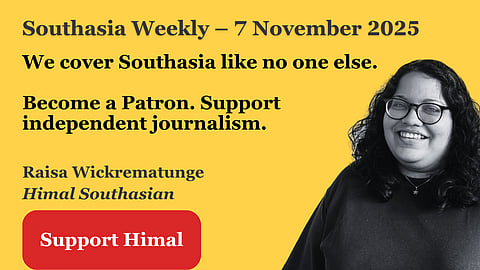The Bhima Koregaon case and India's war on dissent – Southasia Weekly #91
Over the past two days, a catchy rap song has floated across my Instagram stories. Titled ‘Nani’ it features Zohran Mamdani before he entered politics, rapping an ode to his grandmother, Praveen Nair. The song has been getting extra play this week as Mamdani won the race for New York mayor, becoming the first Muslim, and the first Southasian, to do so. Mamdani has not shied away from foregrounding his Indian roots, peppering his speeches with Bollywood references or the occasional Hindi word for emphasis (as many Indian publications breathlessly reported, he walked off the stage after his win to the sounds of Dhoom Machale.)
Mamdani faces a tough journey ahead as he attempts to win over establishment politicians and other gatekeepers who backed his political opponents. But the fact that he was able to win the mayoral race with little to no institutional support and name recognition is remarkable, particularly in the wake of xenophobic rhetoric that often focused on his Southasian identity. At Himal, we’re glad to see Southasia take centre stage. We’ve long worked to give the region the attention and coverage we think it deserves. That’s why you should become a Patron and support our work, so we can keep telling the story of Southasia to our readers – as a publication that embraces all that Southasia has to offer.
With that, I bring you this week’s update.
This week in Himal
Uttaran das Gupta writes that the Bhima Khoregaon case, and the targeting of 16 activists known for their work with Adivasis and Dalits, has become symbolic of the cracks in India’s democracy, in a review of Alpa Shah’s ‘The Incarcerations’.
On the Saffron Siege podcast series in collaboration with Karwan-e-Mohabbat, musician and political commentator T M Krishna speaks to Harsh Mander about Tamil Nadu’s long history of social movements that has bolstered its resistance to the RSS and Hindutva.
This week in Southasia
New York elects first Indian-American mayor with Zohran Mamdani
On 5 November, Zohran Mamdani won the race for the post of New York mayor, in an election that saw record turnout, beating out establishment candidates. Much of the media coverage has focused on his overlapping identities, describing him as the first Muslim, the first Southasian and the person of Ugandan origin to be elected mayor. In his speech after winning the election, Mamdani quoted from India’s prime minister Jawaharlal Nehru’s well-known 1947 speech on the eve of Independence, and shared the stage with his parents, Indian filmmaker Mira Nair and Ugandan academic Mahmood Mamdani on stage, alongside Brooklyn-based artist Rama Duwaji, his partner. These acts were small but significant, given the wave of hateful rhetoric that has followed Mamdani on the campaign trail in the US.
Mamdani’s rise has been met with a relatively muted and even critical reaction in India, compared to Indian-American political candidates in the past, due to his Gujarati Muslim heritage and his staunch criticism of India’s prime minister Narendra Modi and the BJP. Tellingly, many Indian media outlets described Mamdani as the first Southasian to be elected mayor of New York, avoiding mention of his identity as an Indian-American. A report from Dalit advocacy group Equality Lab found that Indian-origin social media users described Mamdani as ‘anti-Hindu’ and ‘anti-India’. Given this, Hemang Ashwinkumar’s review of Salil Tripathi’s ‘The Gujaratis’, which exposes the shameful underside of Gujarati pride, including their unease around Mamdani’s rise, is worth revisiting.
From the archive
Elsewhere in Southasia:
Indian journalist Rana Ayyub and father face death threats after anonymous caller demands Ayyub write about 1984 anti-Sikh riots, profile of caller matches Indian gangster Lawrence Bishnoi linked with extortion-related attacks in Canada
Five Chinese mafia members sentenced to death, 16 others convicted for role in Myanmar’s junta-supported cyberscam centres
Earthquake in northern Afghanistan leaves at least 20 dead, damages historic Blue Mosque
Indian Lokh Sabha Opposition leader Rahul Gandhi claims vote theft in 2024 Haryana polls, accuses India’s Election Commission and BJP of working together; Elections Commission denies claims
Sikh pilgrims from India permitted to cross Pakistan border in first opening since Pahalgam attacks
The Maldives bans tobacco sales to people born after 2007, setting world precedent after similarly stringent New Zealand law repealed
Temple stampede in Andhra Pradesh, India leaves nine dead, all women and children; sixth crowd surge in India this year
Clashes reported in Dhaka around July charter on political reform, political campaigning events in Bangladesh as one BNP candidate shot and another’s house burned
Bihar election proceeds after controversial voter roll revisions that are being challenged in Supreme Court over lack of transparency, large-scale deletions
Revisit some of our archival stories adding more context to some of this week's news updates from Bangladesh and India

